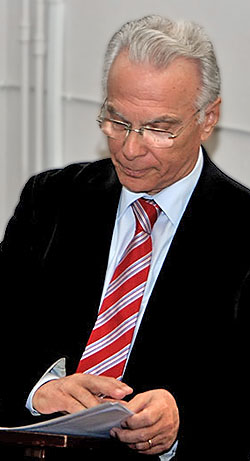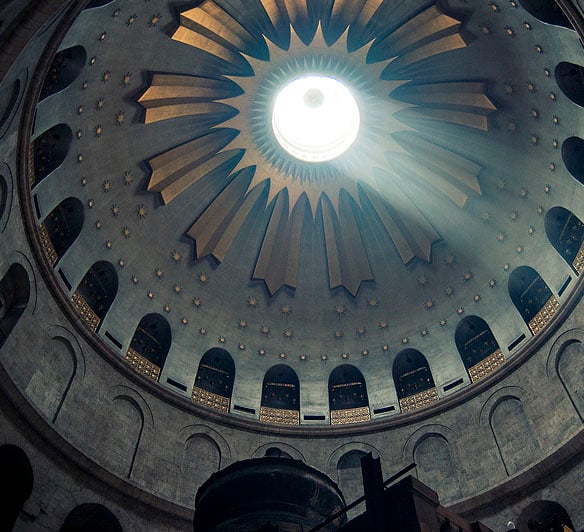Why the Great Synod of Orthodoxy is necessary today – 1
9 December 2015 The address of the professor emeritus of the Theology Faculty, which was given at the conference organized by the Monastery of Vatopaidi, in collaboration with the Patriarchal Institute of Patristic Studies and the Theological School of the Aristotle University of Thessaloniki, (3-5 December, 2015) on the subject ‘Towards the Holy and Great Synod’.
The address of the professor emeritus of the Theology Faculty, which was given at the conference organized by the Monastery of Vatopaidi, in collaboration with the Patriarchal Institute of Patristic Studies and the Theological School of the Aristotle University of Thessaloniki, (3-5 December, 2015) on the subject ‘Towards the Holy and Great Synod’.
Introduction
As is well known, at the fifth Meeting of the Primates of the Orthodox Autocephalous Churches to be held since 1992, this one under the chairmanship of Ecumenical Patriarch Bartholomew, from 6 to 9 March, 2014, in the church of Saint George in Fanari, Constantinople, a decision was taken that is of momentous importance for the whole of Orthodoxy. It was decided to put flesh and bones onto the vision, which had been gestating for many years, of the convocation of the Holy and Great Synod of the Orthodox Church, at Pentecost 2016, unless unforeseen circumstances prevent this. The suggestion was made that, provided permission is granted by the Turkish Ministry of Culture, this should take place in the old Cathedral Church of Saint Irene, where the 2nd Ecumenical Synod took place in 381.
The momentous significance of this Synod for the whole of Orthodoxy is obvious. For the first time in more than a thousand years, representatives of all local Orthodox Churches would gather to discuss and take common decisions on the most important issues which have been facing the Orthodox flock, and, indeed, the whole of humankind, for decades now, because of the unprecedented and pressing challenges we are confronted by in the rapidly changing modern world. From this point of view, the convocation of the Holy and Great Synod is vital, if Orthodoxy is to respond to the challenges of the times, by providing a powerful testimony to its theanthropic presence a modern world which is floundering spiritually, morally and socially.
- The Holy and Great Synod facing the challenges and problems of the modern world
The challenges and problems which the Orthodox Church is being called upon urgently to face through the Holy and Great Synod by providing a dynamic testimony to its presence in the modern world were described very clearly and eloquently by the Ecumenical Patriarch, His All-Holiness Bartholomew, in his opening address at the Meeting of Primates of the Orthodox Autocephalous Churches. In the first place, as the Ecumenical Patriarch noted, the violence which is often perpetrated in the name of religion is a threat to all Christians, without exception, but for the Orthodox in particular, since they are experiencing personal persecution, destruction and desecration of their holy churches, as well as kidnappings and murders of clergy and monastics, even hierarchs of the Church. In the face of this threat to the Orthodox Churches as we know them, we are called, he noted, ‘to raise our voices in protest, not as individual persons or Churches, but as the single Orthodox Church, united throughout the world’[i].
Apart from this, there is also the enormous danger to the Orthodox Church, and other Churches, too, of course, posed by the rapid secularization of Christian societies. As we all know, the Church in secularized Christian societies has increasingly been forced into the margins of public life, unfortunately, and the fundamental spiritual and moral principles of the Gospel are gradually being sidelined from people’s lives. The Orthodox Church, therefore has a duty, responding in accordance with its own nature and mission, to promote these Gospel values to the modern world with a single voice, irrespective of whether they conflict with important interests or prevailing notions.

Although, as the Ecumenical Patriarch has stressed, the Orthodox Church is characterized also by its attachment to the tradition of the past, this does not mean that it is fossilized and indifferent to the various challenges of history which are particularly acute in our own day. One such challenge arises from the rapid development of technology and the globalization based on this. Despite the beneficial effects as regards the dissemination of knowledge and information, technology constitutes a serious danger because it is a channel for the transfer and imposition of foreign cultural models which threaten to alter the cultural identity of individual peoples. This is another challenge which the Church has to meet. Beyond this threat from technology and linked to it, is the rapid evolution of biotechnology, which involves the emergence of serious bioethical problems related to the technologies of assisted reproduction, transplants of tissues and organs, euthanasia, genetically modified foods and so on, towards which the Church is duty bound to take a responsible stance. Moreover, if we add to all this the daily destruction of our natural environment through our greed and high-maintenance lifestyle (despite warnings from the ‘great and the good’ of this earth), then the conservation and protection of God’s ‘very good’ creation is a prime duty of the Church. In fact, given its rich liturgical and ascetic tradition, Orthodoxy is the sole responsible agent, which can contribute to the combatting of this crucial problem in ways not available to other Churches and Confessions[ii]. In any case, this is why the Ecumenical Patriarchate, as we all know, was, in 1989, the first in the whole of Christendom to promote and highlight the importance of this crucial issue, through a series of significant initiatives, such as the establishment of the beginning of the Indiction (1 September) as the day for the protection of the natural environment, with the late hymnographer Yerasimos from the Small Skete of Saint Ann, being commissioned to produce a service which is sung on that day. Besides this, a whole host of international ecological conferences have been organized, with speakers of world-wide repute. This means that Orthodoxy can and should play a leading role in the conservation of the natural environment.
But apart from the problems outlined above, the Orthodox Church also has a duty to deal sympathetically with the problems arising from the economic crisis and social injustice which, in our own times appear to be a scourge even in the most highly-developed economies. Alas, these problems are not merely economic and social; they are psychological and profoundly existential, because they touch upon the dignity and self-respect of people who have become victims of the global economic establishment. As the Ecumenical Patriarch again notes: ‘Our Most Holy Church must listen with attention and sympathy to the problems inflicted on people by the economic structure of the modern world. We are all witnesses of the negative effects on the dignity and survival of the human person from the economic crises which are crushing people in many regions of the world, even in countries supposedly economically ‘developed’. Youth unemployment, an increase in the number of the impoverished, uncertainty about tomorrow- all of these demonstrate that humanity today is a long way from implementing the principles of the Gospel. And we ourselves are not without responsibility since our pastoral care has often been exhausted by concentration on the ‘spiritual’ and we have forgotten that people also need nourishment and the barest material means in order to live decently, as persons who are images of God’[iii]. For these reasons, the Orthodox Church, faithful to the principles of the Gospels and without giving the impression that it is indifferent to spiritual matters, has a duty to proclaim its interest in the eradication of social injustice and the ascendancy of social justice throughout the world. Moreover, this interest on its part is not foreign to its nature and its spiritual mission in the world, because, in essence, it is a spiritual matter. As Berdyaev so aptly pointed out, giving the Orthodox dimension to the interest in finding solutions to economic and social problems: ‘Concern over the life of one’s neighbor, even in material and bodily terms, has something spiritual about it Worry about how to guarantee my bread is a material problem. But worry about other people’s bread is a spiritual problem’[iv]. Indeed, it is worth pointing out that this position is stressed almost word for word in the Resolution of the Fifth Pre-Synodal Pan-Orthodox Meeting (Chambésy-Geneva, 10-17 October, 2015), which refers to the mission of the Orthodox Church in the modern world[v].
It continues here: http://pemptousia.com/?p=32283
[i] See www.amen.gr/article17136#sthash.Rmz056Eq.dpuf.
[ii] Ibid.
[iii] Ibid.
[iv] See Το πεπρωμένο του ανθρώπου στο σύγχρονο κόσμο, transl. Eft. Yioultsi, pubd. by P. Pournaras, Thessaloniki, 1980, p. 13. See also St. Ch. Tsombanidis, Εκκλησιολογία και Παγκοσμιοποίηση. Οι Εκκλησίες στην οικουμενική πορεία για μια εναλλακτική παγκοσμιοποίηση στην υπηρεσία των ανθρώπων και της γης, pubd. by P. Pournaras, Thessaloniki 2008, p. 96. Θεσσαλονίκη 2008, σ. 96.
[v] See chap. ‘Mission of the Orthodox Church in the Modern World. Contribution of the Orthodox Church to the Establishment of Peace, Justice, Freedom, Brotherhood and Love among Nations and Elimination of Racial and Other Forms of Discrimination 6, § 5: ‘if concern over our nourishment is a material issue, concern for the nourishment of others is spiritual. (Jas.2, 14-18).






